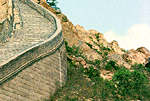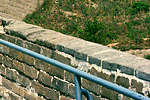 |  |  |  |
 |  |  |  |
 |  |  |  |
 |  |  |  |
| June 6, 2002 Tight
Spot |
|
Now China and
South Korea are engaged in a stand-off regarding four N. Korean asylum seekers.
China wants the four handed over and S. Korea accuses the Chinese of hypocrisy.
China is facing renewed pressure from East Asian and Western countries to finally
come to terms with its relationship with N. Korea. The message is: take responsibility
for N. Korea and start working for regional stability. Up till now, Beijing has
repeatedly assumed a position of righteous neutrality under the cover of "international
and Chinese laws." This position will not survive long. China is trying to have the cake and eat it too: China's economic growth demands and requires political growth as well, but Beijing is hoping to exert power economically without entangling itself in international political webs. Unfortunately for modern China, economics and politics are inextricably linked. Selling weapons and technology is good business, but when business lacks a moral (or political) foundation, conflicts arise. If China continues to increase its manufacturing capacity, thereby also increasing exports, regional neighbors will be hard-pressed to maintain their own export-driven economies. Japanese workers are watching their employers move across the sea, South Asian exporters are slashing prices and the ASEAN nations are pressing for a free-trade agreement with China. All these developments have domestic repercussions. Even if Japanese Prime Minister Koizumi declares the rise of China a boon for all of Asia, he must deliver to his constituents who are wallowing in a stagnant economy, searching for part-time employment. China cannot move from peasant kingdom to nobility but reject the responsibilities that come with power and quasi-rule. China must see itself as a force for peace and stability in Asia and not just as an economic engine devoid of any goals but profit and ascendance. Both N. Korea and Pakistan look to China for both political and economic support -- so far China is only willing to do business. Most Asian heads of state still see China's rise as mutually beneficial, but when cheap Chinese exports and labor relieve the surrounding nations of money and jobs, anti-Chinese sentiment will rise. In Thailand, Vietnam, Malaysia and Indonesia an entrenched Chinese (economic) aristocracy was targeted during the 1997-98 Asian financial meltdown; China may very well become to East Asian nations what the U.S. is to Latin American nations, albeit without the job market. One way for Beijing to soften the blow of China's rise is to show that behind the business deals and high-minded speeches stands a real desire to improve the standard of living in Asia, and not just within China. Instead of bickering over N. Korean refugees, solve the problem at its source; instead of propping up Pakistan's military, take the initiative and call for negotiations in Beijing. If Beijing sees the U.S. as an unwanted rival in Asia, then perhaps China should do something about it. And yes this is a lot to ask of a country with 900 million peasants, 150 million migrant workers, rampant political corruption and thuggery, serious environmental problems and a population set to burst the nations at its seams. But with a dream-like meteoric rise to power come real dizzying responsibilities. |
Text-only printable version of this article Sascha
Matuszak is a teacher living and working in China. His articles have appeared
in the South China Morning Post, the Minnesota Daily, and elsewhere.
His exclusive Antiwar.com column (usually) appears Fridays. Archived columns 1.3
Billion Problems For China China's
New Post-9/11 Status
Sweep 'Em Off the Streets
Chinese Embrace Progress China's
Afghan Agenda New
War May Reveal New Superpower, Part II New
War May Reveal New Superpower A
Chance for a New Friendship? Cheating
as a Way of Life China's
Internet Generation Free
Markets or Supermarkets Sailing
Towards World Significance China's
Youth Revolution |
Please Support Antiwar.comSend contributions to Antiwar.com or
Contribute Via our Secure Server | |
